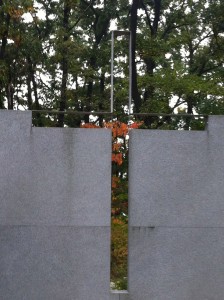We will leave no honors, no love, no fame …
By Sheryl Johnson. Sheryl is KAIROS’ Fundraising Assistant, and is attending the WCC Assembly in Busan on behalf of the Global Ecumenical Theological Institute. On an excursion to Gwangju, she is inspired by the students and churches that led a pro-democracy uprising in 1980s.
We will leave no honors, no love, no fame.
We promised to keep working on;
long as we shall live streams and mountains forget nothing
though the years pass by.
–from Imeul wihan haengjin-gok (Marching for our Beloved) by Baek Gi-wan/Hwang Seok-young
This weekend, at the half-way point of the Assembly, many WCC participants left Busan to participate in exposure visits to different parts of the country. The Global Ecumenical Theological Institute went to Gwangju to learn about the May 18, 1980 pro-democracy “Incident/Uprising” (the official term was changed in 1995). The text quoted above was adapted from a poem written in December 1980 by Baek Gi-wan, a social reform activist and Korean re-unification crusader, to commemorate the event.
Led by students and the churches in Gwangju, the uprising was an explosion of civil dissatisfaction with the military junta that had seized power in South Korea. The uprising brought people together in tremendous ways: students risked their lives to wait in long lines to donate blood for the many who were wounded; taxi drivers volunteered to transport the injured to hospitals at great personal risk; shop-keepers gave out food and supplies for free.
During the ten day uprising, over 150 people were killed by the military that was sent in to suppress the peaceful peoples’ movement. The media also suppressed and misrepresented the uprising by describing it as a riot. To this day there are those who do not believe it was related to democratization.
There is now a beautiful monument in Gwangju that tells the real story of what took place. I have to wonder how the uprising may have been different today, with social media and more direct access to people. I am challenged by the witness of churches and students to risk their lives for the benefit of their country despite the fact that many were led to believe they were working against the country.
Many cite this incident as central to the modern development of minjung (“the mass of the people”) theology, commonly referred to as the Korean theology of social liberation. Minjung particularly refers to those who are politically, economically, culturally, and religiously oppressed, but there is also emphasis on the fact that these people are actors in history, not merely objects of their oppression.
Visiting Gwangju has helped me to begin to understand the context of liberation theology and to be inspired by the faithful witness of the many who struggled for democracy. As we work for justice in our own contexts today we are surrounded by a tremendously diverse cloud of witnesses who call: “we are marching ahead, keep faith, follow us.”









